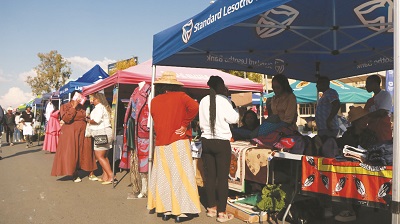By: Koena Mokobocho
The Basotho Flea Market, held on Saturday, April 27th, 2024, on Kingsway Road between the State Library and Lancers Inn, was more than just a collection of stalls.
It is a dynamic exhibition of Basotho enterprise, cultural pride, and environmental concern. Among the numerous firms there, each had a distinct narrative to tell, representing the various motivations behind their venture.
Toka Letsie, the owner of Senqu Charcoal, exemplifies creativity and entrepreneurship. Toka’s business venture, which involved crafting charcoal from the “sehalahala” plant, was motivated by a desire for product uniqueness.
His participation at the flea market is about more than just selling; it is about introducing his creative products to the market, measuring demand, and laying the groundwork for future efforts.
For him, the trip has only just begun, propelled by a desire for creativity and commercial savvy practices.
Similarly, Itumeleng Mohase, a maker of “Seshoeshoe“-inspired items such as pen holders and vases, demonstrates the relationship between culture and practicality.
Recognizing the importance of culturally representative items, Itumeleng’s designs not only serve functional reasons but are also symbols of the Basotho culture.
Her appearance at the flea market, which caters to a wide range of clients such as people, businesses, and event planners, shows the platform’s importance in encouraging cultural expression and entrepreneurship.
Aside from ethnic representation, the flea market additionally serves as a platform for the discussion of environmental issues.
Limpho Thoahlane founded Pheha Plastic, which attempts to combat plastic usage and its negative environmental impact. Pheha Plastic, which makes coasters, earrings, flower pots, and mugs out of recycled HDPE and PP plastics, makes its flea market debut, marking a huge step forward in its mission to reduce plastic pollution.
Polo Makhetha, representing the Wise of Meliel, an entertainment company established in 2016, contributes to the range of projects.
Polo states her desire to improve the lottery industry in Lesotho, despite her initial focus on entertainment. She proudly displays her book, “I Am the Village of Meliel, Logic Lottery Book 1,” which is a thorough handbook for individuals interested in gambling, betting, and lottery. Polo’s involvement highlights the flea market’s importance as a forum for exploring new business opportunities and sharing experiences.
The Basotho Flea Market is more than just a business event; it is a gathering of aspirations, with Basotho entrepreneurs displaying their creativity, cultural heritage, and commitment to environmental sustainability.
It is a testament to the Basotho people’s endurance and inventiveness, expressing the spirit of progress while also preserving their culture.


